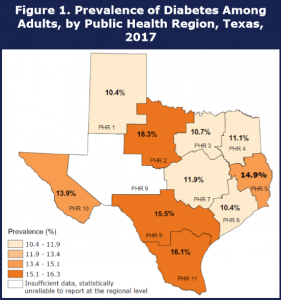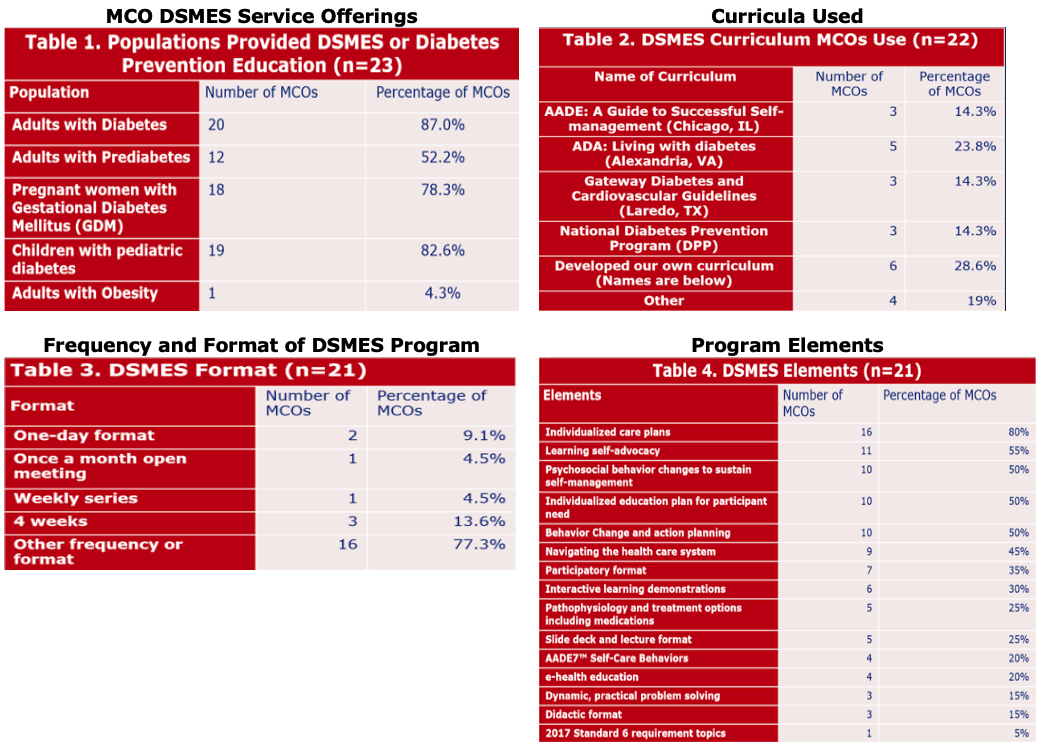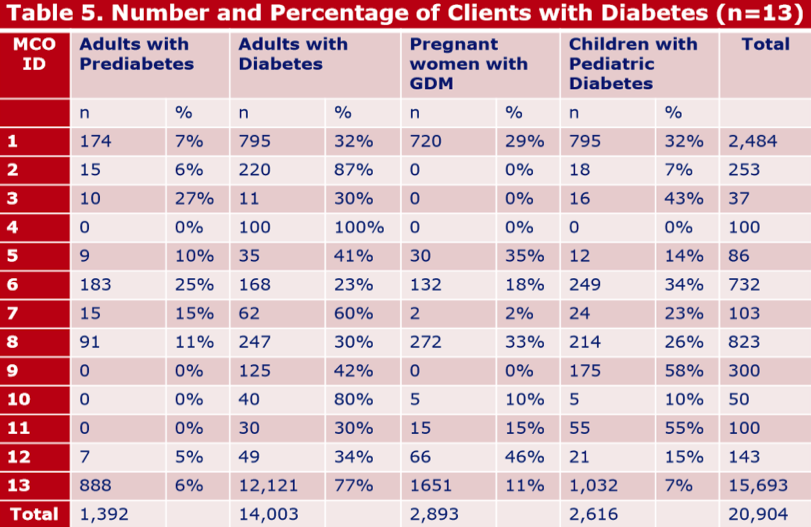Texas Medicaid Managed Care Organizations Survey Update[1] – Maria Cooper, DSHS.
The statewide assessment of diabetes status in Texas shows that the prevalence of diabetes has increased 44 percent over the past decade and is on a projected course to quadruple in the next 25 years. In 2017, more than 2.5 million (11.9 percent) adult Texans reported to be diagnosed with diabetes. In 2016, 5.7 percent of live births were to women with diabetes, which increased to 6.1 percent in 2017. Another 1.7 million (9.5 percent) Texans have prediabetes- a condition that makes them more likely to develop type 2 diabetes within the next 10 years, and more likely to have a heart attack or stroke. Millions more Texans are likely to have prediabetes but aren’t diagnosed.

The Texas Diabetes Council (TDC) advises the legislature on legislation that is needed to develop and maintain a statewide system of quality education services for all persons with diabetes. As TDC develops its state plan for diabetes treatment, education, and training, it is helpful to gain insight on diabetes self-management education and support (DSMES) resources offered to Medicaid enrollees. Input from Managed Care Organizations (MCOs) will help guide development of TDC priorities. The prevalence of diabetes in Texas has increased 44 percent over the past decade and 1.7 million (9.5 %) Texans have prediabetes. As Texas Diabetes Council develops its state plan for diabetes treatment, education, and training, it is helpful to gain insight on diabetes self-management education and support (DSMES) resources offered to Medicaid enrollees. Input from Managed Care Organizations (MCOs) will help guide development of TDC priorities
The Texas Department of State Health Services (DSHS) worked with the Texas Diabetes Council to develop the questionnaire to survey MCOs. The survey covered whether or not the respondents offer Diabetes Self-Management Education and Support (DSMES) services, and if they did, details about those programs. The survey link opened on Feb 14, 2019 and closed on March 19, 2019 and was sent to 230 unique email addresses through the Health and Human Services Commission (HHSC) MCO Notices distribution list. Twenty-six respondents completed the survey.

Regarding the retention rate, it is defined as the percentage of clients who complete all sessions of DSMES and diabetes prevention education. The mean retention rate of the MCOs (n=12) was 46 percent. The highest retention rate was 85 percent (n=3) using the AADE: A Guide to Successful Self-management. The lowest retention rate was 10 percent (n=3) using the National Diabetes Prevention Program (DPP). The majority of the MCOs who reported offering services “as needed” did not provide retention rates.
Number of Clients with Diabetes

Barriers to Implementing DSMES. MCOs were asked about barriers they faced implementing DSMES services. Nine (9) out of 12 reported the biggest barrier was client engagement and compliance and three (3) out of 12 reported the biggest barrier was getting correct contact information from clients.
Other Comments. Twelve MCOs provided information on current programs, successes, and plans for the future describing further details on what DSMES offered; Four described expanding on partnerships (working with parent company, offering DSMES through other providers, and working with community health workers); Using bidirectional referrals; Identifying barriers they want to overcome to increase utilization.
The limitations of the survey included:
- Due to the content of the survey, MCOs that do not offer DSMES were probably less likely to answer the survey.
- Due to the low response rate to this survey, results should not be generalized to all MCOs in Texas.
- Reported retention rates may not accurately reflect the nature of all DSMEs programs offered by the MCOs.
In conclusion:
- 26 MCOs provided information about their DSMEs and diabetes prevention education.
- The majority covered DSMES for at least adults with diabetes.
- Many provided services to adults with prediabetes, children with pediatric diabetes, and women with GDM.
- MCOs used a variety of different curricula, and several created their own.
- The majority incorporated individualized care plans.
- MCOs’ reported average retention rate was 46%.
- The greatest barrier reported was patient engagement.
The Chair stated that of the 230 emails, we need to know how many were from which MCO. All MCOs should have been required to do the survey. She stated that it is important to have accurate statistics, and it would be important to know which MCOs responded. Some of those 230 emails must be duplicates since there are only 20-something MCOs.
A statement was made that after the data is cleaned up, it should be presented at the MCO medical directors meeting.
MOTION: present refined data to the quarterly MCO meeting, prevailed.
For the complete coverage of the meeting, please follow this link.
[1] Presentation material unavailable to include in this document.
***
The information contained in this publication is the property of Texas Insight. The views expressed in this publication are, unless otherwise stated, those of the author and not those of Texas Insight or its management.

